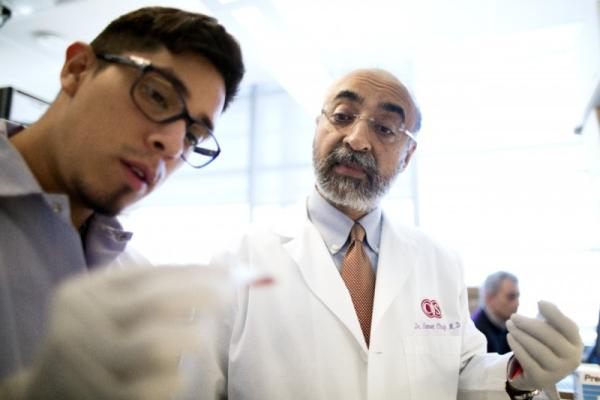
January 30, 2023 — Two novel research studies from Cedars-Sinai move the needle on predicting two important heart conditions--sudden cardiac arrest, which is often fatal, and increased coronary artery calcium, a marker of coronary artery disease that can lead to a heart attack.
The studies were led by investigators in the Smidt Heart Institute at Cedars-Sinai and the medical center’s Division of Artificial Intelligence in Medicine (AIM).
Investigators involved in the cardiac arrest study, published in the peer-reviewed journal Heart Rhythm, identified a panel of novel blood biomarkers specifically associated with sudden cardiac arrest. These biomarkers have the potential to enhance the clinical prediction of sudden cardiac arrest--a life-threatening condition making headlines after NFL player Damar Hamlin experienced cardiac arrest mid-game earlier this month.
Sudden cardiac arrest is the sudden loss of heartbeat and affects more than 350,000 in the United States annually. Despite an organized emergency medical response system, fewer than 10% of individuals who have a cardiac arrest will survive.
"The dismal survival rates for sudden cardiac arrest exemplify the need for risk determination, early prediction, and improved primary prevention," said Sumeet Chugh, MD, senior author of the study, professor and director of both the Heart Rhythm Center and the Division of AIM.
Chugh, also director of the Center for Cardiac Arrest Prevention at Cedars-Sinai, has devoted his career to studying sudden cardiac arrest. His research has led to novel methods of predicting sudden cardiac arrest that are currently being evaluated with the goal of deploying these in clinical care.
In this study, a collaborative effort with the Van Eyk Laboratory at Cedars-Sinai, researchers analyzed a large number of blood biomarkers obtained from survivors of sudden cardiac arrest, comparing results from one cohort of people without coronary artery disease and one cohort with the disease.
"We identified a total of 26 protein biomarkers associated with sudden cardiac arrest when cases were compared to controls, of which, 20 differentiated sudden cardiac arrest from coronary artery disease," said Faye Norby, PhD, a research scientist at the Center for Cardiac Arrest Prevention in the Smidt Heart Institute and first author of the study. "While these biomarkers have the potential to enhance prediction of sudden cardiac arrest, future studies are needed to replicate these findings in a larger group of patients."
The coronary artery calcium study, published in the Journal of the American Society of Echocardiography, shows for the first time that an ultrasound image of the heart can be "read" by an artificial intelligence algorithm to accurately identify whether a patient has a large amount of buildup in their coronary arteries.
Traditionally, coronary artery calcium buildup is diagnosed using CT scans, which are not available at every center, expose patients to radiation, and are costly. On the other hand, heart ultrasounds--also called echocardiograms--can be done in a clinic or doctor’s office, do not produce radiation, and tend to be much less expensive.
"We show that echocardiograms, when interpreted with our AI software, can predict coronary artery calcium and predict heart attack risk nearly as well as CT scans," said senior author David Ouyang, MD, a cardiologist in the Department of Cardiology in the Smidt Heart Institute and a researcher in the Division of AIM. "This proved true even in cases where the naked eye of an expert reader sees the ultrasound image of the heart as appearing fairly normal."
Using a dataset of 2,881 echocardiogram images, investigators trained a video-based artificial intelligence tool to predict coronary artery calcium scores. Scores range from zero--representing a "perfect" score with no indication of coronary artery calcium buildup--to more than 2,000, a poor prognosis for individuals, representing high risk of heart attack and coronary artery disease.
The video-based deep learning model successfully predicted scores of zero in patients with good health as well as high coronary calcium scores, likely foreshadowing a worse future prognosis.
Ouyang and team hope this efficient technology--inclusive of a coronary artery calcium score for each patient--may be used in all echocardiogram laboratories. This type of resource, Ouyang says, "will allow for faster, potentially more frequent, and generally more cost-effective imaging that provides clinically valuable, predictive information."
For more information: www.cedars-sinai.org
Related Sudden Cardiac Arrest Content:
Sudden Cardiac Arrest Foundation Urges Public Awareness and Action After Collapse of Damar Hamlin
Rising Star Footballers Among Young Athletes to Benefit From New Screening Tool
VIDEO: Should Student Athletes be Screened for Sudden Cardiac Arrest?
American Medical Society for Sports Medicine Position Statement Evaluates Role of ECG in Athletic Cardiovascular Screening
Cardiac Ultrasound Studies Evaluate Impact of Exercise on Athletes' Hearts
Tackling Cardiovascular Health Risks in College Football Players
Sudden Cardiac Arrest Patient Walks to Ambulance Thanks to Wearable Defibrillator


 February 03, 2026
February 03, 2026 









